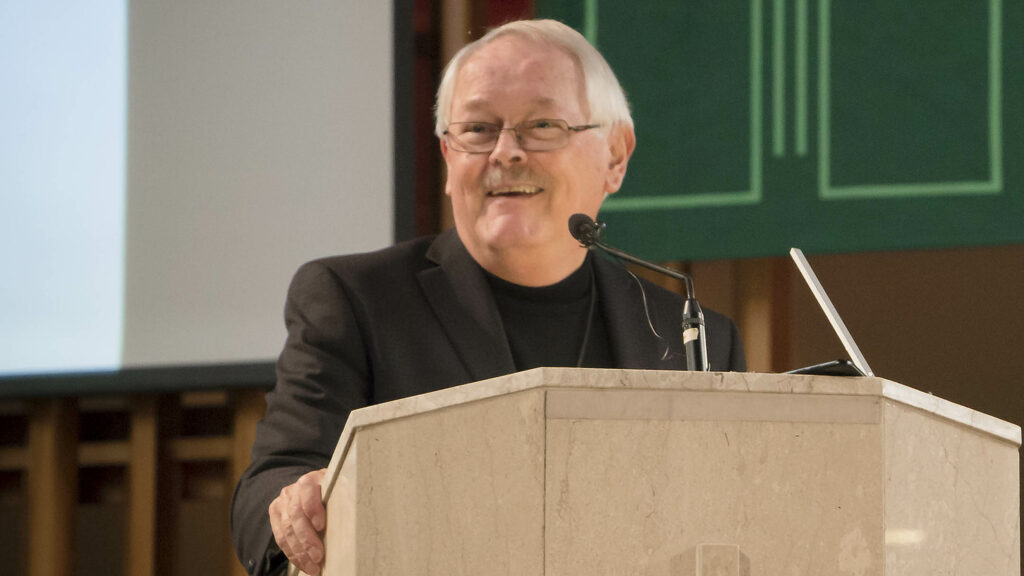He’s a loser! You’re a loser!
Among all the hurtful slurs we mindlessly utter this particular one is perhaps the most hurtful and damaging. It needs to be forbidden in our public discourse and stricken from our vocabulary.
We’ve come a long ways today in forbidding certain language in our public discourse. Mostly the terms that we outlaw have to do with pejorative phrases that refer to someone’s race, gender, or disability. Categorically forbidding them in our language was long overdue and may not be dismissed as simple political correctness. It’s a matter of correctness, plain and simple, of justice, of charity, of fundamental human decency.
Language is an economy that’s also often unjust. It unfairly affirms some and unduly slanders others. We need to be careful with it. Language can deeply scar others, even as it keeps us unconsciously locked inside negative stereotypes that leave our minds and our hearts colored by racism, bigotry, and misogyny.
But racial, gender, and disability slurs are not the only slurs that cut, wound, and scar others. Terrible as they are, those insulted by them have the consolation of knowing that the insult is aimed at millions (or, in the case of gender, billions) of others. There’s consolation in numbers! Being shamed along with millions or billions of others still hurts, but you’re in good company.
There are slurs however, insults, that are more brutally singular and more cruelly personal, which aim to shame one’s particularly private inadequacies. With such a slur you’re no longer in good company, you’re now unanimity-minus-one.
The term “loser” is such a slur. It aims to shame a person in a very singular, hurtful way.
When you’re called a “loser”, you’re not being singled out and shamed because you belong to a certain set, a race, a gender, or a class of people.
You’re being shamed because you – you alone, singularly, personally – are judged as not measuring up, as not worthy of respect, and as not worthy of full acceptance. You’re judged as inferior with an inferiority that cannot be blamed on anyone except yourself. You’re deemed a loser! And you’re alone in that!
This kind of shaming isn’t new. It has ever been thus. Certain people have always been shunned, shamed, and ostracized.
We have this curious human flaw that, unless it’s addressed, has us believe that for us to be happy it isn’t enough that we be accepted, someone else has to be excluded.
In biblical times, people who had leprosy were ostracized from society, condemned to live in regions outside of normal life, and cry out “unclean” whenever anyone approached them. But they had legitimate reasons for putting these persons outside the circle of normal life. Leprosy held the danger of contagion.
Today, without any kind of legitimacy, we’re still designating certain people as “lepers”, as unfit to flourish inside the circles of normal life. We classify them as “losers” and condemn them to the fringes. They’re the new lepers.
Examples of this abound, but perhaps we see this most simplistically played out in our high schools where there is always a crowd that’s popular, an “in” crowd who dictates the ethos, decides what’s acceptable, and holds down the center of the community, even as they don’t constitute its majority.
The majority of students are outside that more-exclusive inner circle of popularity, on the edges of it, trying for full acceptance, not fully “in” and not fully “out”.
But there’s always still another set, the ones seen as “losers”, as not measuring up, as not being worthy of full status and recognition. This group is not given permission to fully belong. Every human circle has that category of persons.
There are a myriad of complex reasons, many to do with mental health, which can help explain why, sometimes, tragically, a high school boy will take up a gun, come into his school, and shoot his classmates.
But it’s hard not to notice that, almost always, it’s a young man who has been deemed a “loner”, a loser. We can’t blame his immediate peers and his classmates for deeming him such, however consciously or unconsciously this is done. His classmates are victims, not just of this young man’s illness and rage, but also of a society that blindly helps produce this kind of illness and rage.
I’m not a parent, but if I were, I would try with all the moral powers that I possessed as a parent to have my children purge their vocabulary of racial, gender, and disability slurs.
But I would, too, use every moral and persuasive power I had to have them purge their vocabulary of pejorative words that shame someone else in his or her singularity. The word “loser” would be forbidden in the house.
Both society and the church are houses. We have, thank goodness, in recent decades forbidden the use of words that disparage another person on the basis of his or her race, gender, or disability.
It’s time we forbid some other slurs inside the house!

